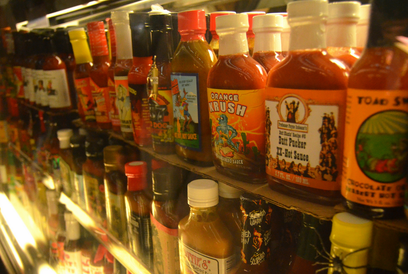
If you're anything like me, you love spicy food. If breaking out in a sweat as you fear that you may actually die from the burning in your mouth fills you with glee, you understand where I am coming from.
One of the most irritating things I experience is when I buy a product that tells me it's going to be hot and then fails to deliver. I have seven open bottles of hot sauce in my fridge right now due to this exact phenomenon.
Likewise, if you're in a grocery store, take a stroll down the aisles. The chip aisle seems to be filled with the most products pretending to be eXXXtreme hot, along with the nuts and other snacks. As someone who actively seeks out foods that are so hot they should be prosecuted for war crimes, there is nothing more disappointing than buying something "hot" and finding out that it's mild.
My question: what market segment that does NOT like spicy food commands so much market share that they've ruined "hot" for the rest of us? The point of this blog isn't to delve into the psychological issues or corresponding machismo in being able to handle the heat...
We're here to talk about market segmentation and playing in the right field.
One of the most irritating things I experience is when I buy a product that tells me it's going to be hot and then fails to deliver. I have seven open bottles of hot sauce in my fridge right now due to this exact phenomenon.
Likewise, if you're in a grocery store, take a stroll down the aisles. The chip aisle seems to be filled with the most products pretending to be eXXXtreme hot, along with the nuts and other snacks. As someone who actively seeks out foods that are so hot they should be prosecuted for war crimes, there is nothing more disappointing than buying something "hot" and finding out that it's mild.
My question: what market segment that does NOT like spicy food commands so much market share that they've ruined "hot" for the rest of us? The point of this blog isn't to delve into the psychological issues or corresponding machismo in being able to handle the heat...
We're here to talk about market segmentation and playing in the right field.

Good companies will meet needs;
great companies will create markets.
Philip Kotler
As a hot sauce lover, I am demoralized, angry, and offended. However, as someone fascinated by consumer marketing I am delighted. The market has created the same terminology to appeal to vastly different customer submarkets with directly opposing goals. People who don't like hot sauce (ok, let's just call them wusses) want to feel powerful and exotic, whereas people who do like hot sauce are disappointed. On the other hand, if it's truly hot the wusses react with accusation ("Why would a company make a sauce called Ass In The Tub and then make it so is so dang spicy?!?!") and the spice lovers sigh in relief.
Which market do you want to target? Do you want to sell a feeling or do you want to sell a product that delivers what it says it's going to?
Which market do you want to target? Do you want to sell a feeling or do you want to sell a product that delivers what it says it's going to?

 RSS Feed
RSS Feed
